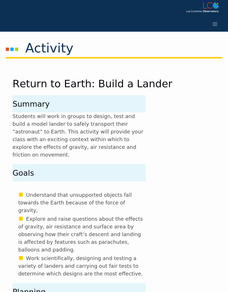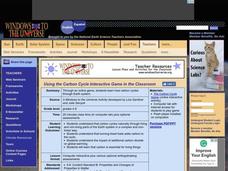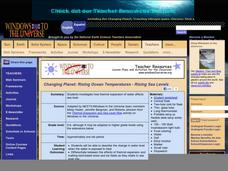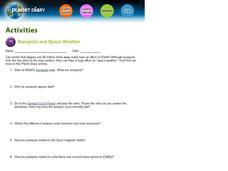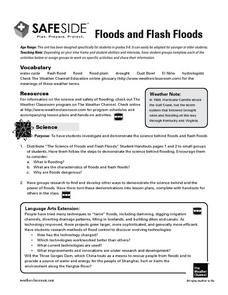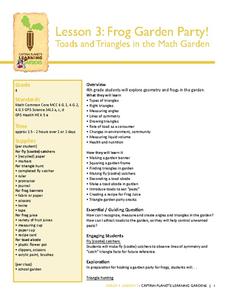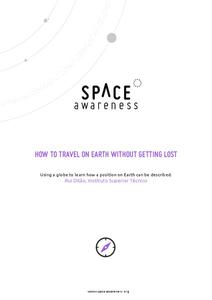Columbus City Schools
The Mystery of Earth’s History
Every living creature can leave a fossil record, yet most fossils belong to extinct organisms rather than ones currently living. Scholars learn about dating rock layers, fossils, and the environment of the past. Pupils understand that...
US Environmental Protection Agency
Aquifer in a Cup
Young scientists create their very own aquifers in this science lesson on ground water. After learning about how some people get their drinking water from underground wells, young learners use sand, modeling clay, and aquarium rocks to...
Curated OER
Terrabagga Activity Using a Magnetometer
Clever! Earth science learners construct a model of a planet containing a magnetic core. The planet, Terrabagga, is made out of a paper grocery bag, magnets, a dead D battery, and rubber bands. Pictures of each step of the construction...
Howard Hughes Medical Institute
Climate and Earth Systems
The components of the atmosphere have a significant impact on long-term climate change. Learners begin by analyzing the role of carbon dioxide in the earth systems and how varying the levels would affect those systems—and ultimately...
Las Cumbres Observatory
Return to Earth: Build a Lander
Earth to all instructors: Here's a resource to use about spacecraft. After learning about gravity and air resistance, scholars create landers with padding to help capsules land safely on Earth. They test their creations by placing a raw...
Curated OER
Earth, Sun and Moon
Students explore, experiment and study how the Earth orbits the Sun once a year and how the moon takes approximately 29 days to orbit the Earth. They access an online activity to examine the process of how the Sun is at the center of the...
Mr. E. Science
The Earth in Space
Do you think Earth makes fun of other planets for having no life? The presentation covers the rotation and revolution of both the earth and our moon. It provides explanations for seasons, tides, and eclipses. Lesson is the 20th in a...
Curated OER
Earth Egg
Students discuss plate tectonics and the layers of the earth's interior. They use eggs as models of the earth and answer questions regarding which part of the egg would represent which part of the earth.
Curated OER
Earth Day: A Look into the World Around Us...
Eighth graders listen to an interactive lecture about Earth Day and related environmental problems and background. They observe a paper mache volcano made of recyclable material and using guidelines make their own art piece as well as...
Curated OER
What's Below the Earth's Surface?
Students identify the geological layers of the Earth. They graphically depict each layer's characteristics. Students label and develop a color key for their exhibit. They create a down-to-Earth 3-D display with Erasable Markers.
Center Science Education
Looking Into Surface Albedo
How does the color of a surface affect the heating of the earth? Middle school science classes experiment with color and surface albedo to determine the relationship. The website has tabs for an overview, teacher's instructions,...
Curated OER
Changing Planet: Black Carbon - a Dusty Situation
Introduce your young meteorologists to black carbon produced by the burning of fossil fuels by showing the video, "Changing Planet: Black Carbon." Viewers discover that deposition of this carbon on polar ice impacts the absorption of...
McAuliffe-Shepard Discovery Center
Global Warming in a Jar
This well-organized lab activity introduces earth science pupils to the greenhouse effect. They will set up two experiments to monitor temperatures in an open jar, a closed jar, and a closed jar containing water. Ideally, you would have...
Curated OER
Where Did They Come From?
Give science learners nine questions about the biogeography of hydrothermal vents and turn them loose to research this fascinating habitat. Working in cooperative groups, they prepare a report that addresses each of the questions. A...
Curated OER
Using the Carbon Cycle Interactive Game in the Classroom
An online reading and interactive game bring the path of a carbon molecule to life for your earth science explorers! As an assessment, learners can map out or write about their experience in the carbon cycle. Thoroughly written...
Curated OER
Changing Planet: Rising Ocean Temperatures - Rising Sea Levels
As an anticipatory set, young environmental technicians watch a video about how ocean temperatures seem to be changing along with the global climate. They perform a laboratory demonstration with the purpose of observing what happens to...
Curated OER
Sunspots and Space Weather
This assignment is out of this world! It is an online instructional activity about sunspots and solar cycles, a sort of WebQuest if you will. Links to two NASA websites and spaceweather.com are written into the questions so that your...
Center Science Education
CO2: How Much Do You Spew?
Split your earth science or environmental studies class into groups and give each a scenario card. Scenario cards describe the lifestyles of 10 different fictitious families, focusing on their energy usage. Carbon dioxide emissions are...
California Academy of Science
Coral and Chemistry
Using cabbage juice as a pH indicator, future scientists explore the effect of increasing carbon dioxide on the pH of the ocean and relate it to the health of coral reefs. Ideal for an earth or environmental sciences course, this lesson...
Curated OER
Floods and Flash Floods
Junior geologists, hydrologists, or meteorologists simulate what happens during the flooding of a river and demonstrate factors that contribute to flash flooding. This outstanding resource provides a vocabulary list, online resources,...
Captain Planet Foundation
Frog Garden Party! Toads and Triangles in the Math Garden
It's frog party time! With frog banners, frog juice, and a triangle hunt, your garden party is sure to be both entertaining and educational. The lesson connects geometry, earth science, and delicious snacks to teach kids about ecosystems...
Curated OER
Earth Turns? Prove It!
Students construct a pendulum using a washer and thin fishing line. In this earth science activity, students simulate Earth's rotation using the pendulum bob and swivel chair. They explain how this activity proves that the Earth is...
University of Colorado
Is There Life on Earth?
To find life on another planet, scientists look for gases (atmosphere), water, and temperatures that are not extreme. In this activity, groups of pupils become "Titan-ians," scientists who want to explore Earth for possible life forms....
Space Awareness
How To Travel On Earth Without Getting Lost
Have you ever wanted to travel the world? Take a virtual trip with a geography lesson that uses longitude and latitude, the position of the sun, an astronomy app, and a classroom globe.






